Anybody who plays the guitar knows that over time and with some serious use, guitar strings can get a really nasty look to them and they sound just about how they look. Dead skin cells, oils, dust, and debris collect on the strings and can taint the natural steel-coloured look to them and you can even scrape off some of this gunk with your fingernail.
That said, electric and acoustic guitar strings are made of a steel-core wire and then they’re wrapped with a nickel-plated steel or copper core wire. This means that they’re somewhat protected from rust because there’s a nice nickel exterior that isn’t nearly as prone to rust.
Guitar strings can rust due to repeated exposure to moisture and humidity from one’s fingers and the environment. However, they’re more likely to tarnish from the dirt and oil on a guitarist’s fingertips. This is because most guitar strings are nickel-plated, which tends to be more rust-resistant.
When people say their guitar strings are “rusting,” what they really mean is that they’re “tarnishing,” so we’re going to use that term considering it’s actually specific and correct. If you leave a set of strings on a guitar for a long time, they get hideously dirty to the point where black gunk can be scraped off them. I wouldn’t necessarily call this “rust,” but a lot of players do.
Why Guitar Strings Are More Likely To Tarnish Before They Rust
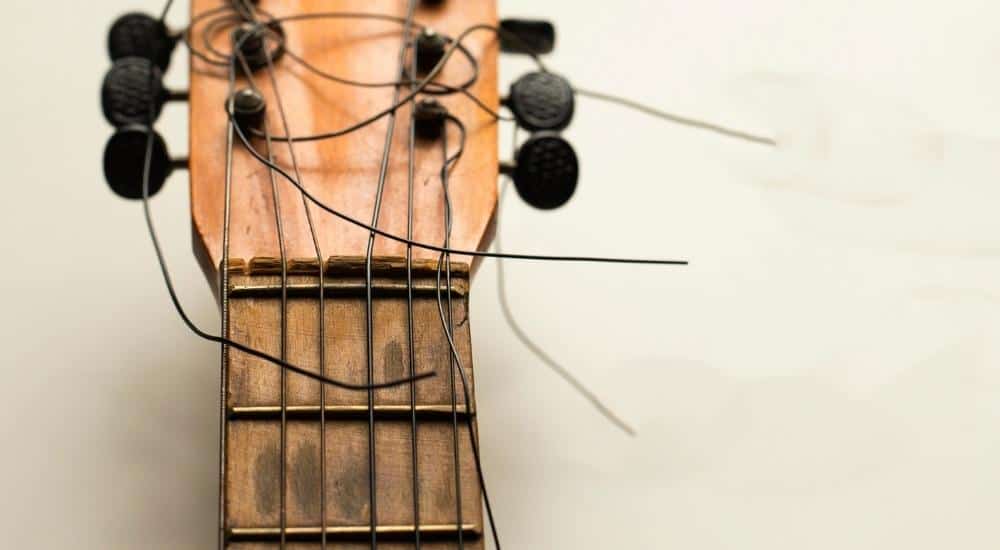
Tarnished guitar strings are a pain for a number of reasons, but the one big one is the fact they start to sound terrible. The reason why they sound bad is that there is an added layer of oils, dirt, and gunk, layered on top of the guitar string, but, usually, it’s not actually rusting unless the moisture has made its way through the nickel/copper and rusted out the inner core wire.
Thankfully, there are a few things that you can do to minimize this problem. As I just mentioned, guitar strings degrade/tarnish because they’re wrapped in nickel/copper and a thin layer of gunk forms over the string over a long period of time, even if it’s just the slightest amount.
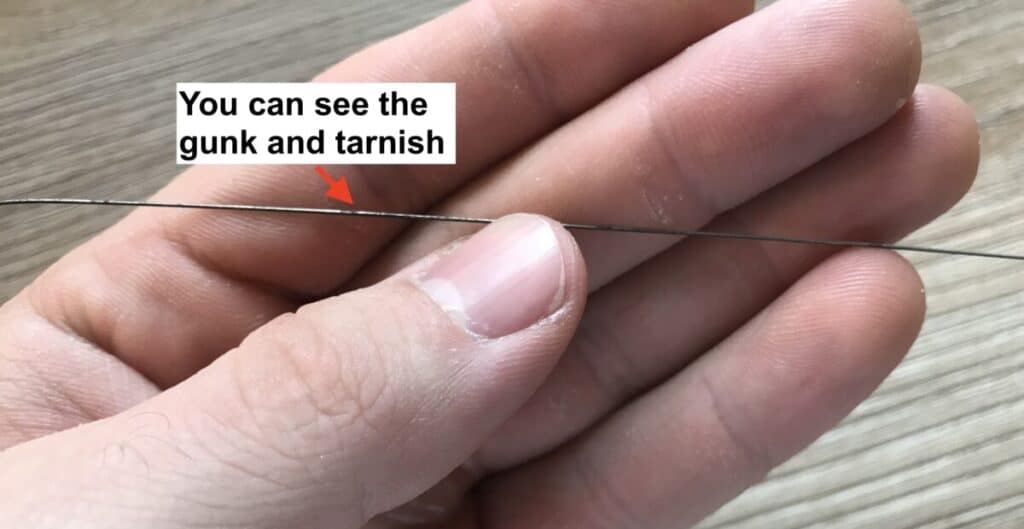
If the inner core wire is made out of iron, and they’re exposed to moisture, whether it’s just water or oils from your fingers, there is a chemical reaction between your finger moisture and the strings that are called “oxidation.”
This process turns the metal into rust. A consequence of this is not only do they sound terrible, but they tend to break much easier after this.
However, as I just mentioned, the vast majority of strings out there tend to have an outside layer made out of a nickel alloy, so they don’t actually rust right away. They just develop a thin layer of gunk over them which leads to a terrible sound.
So we’ve said all that and you get the point. How do we avoid this problem other than just buying new strings? Let’s explore some of the preventative measures you can take to thwart your guitar strings from tarnishing.
How To Stop Guitar Strings From Rusting and Tarnishing
1) Always Wipe Off Your Guitar Strings After Playing
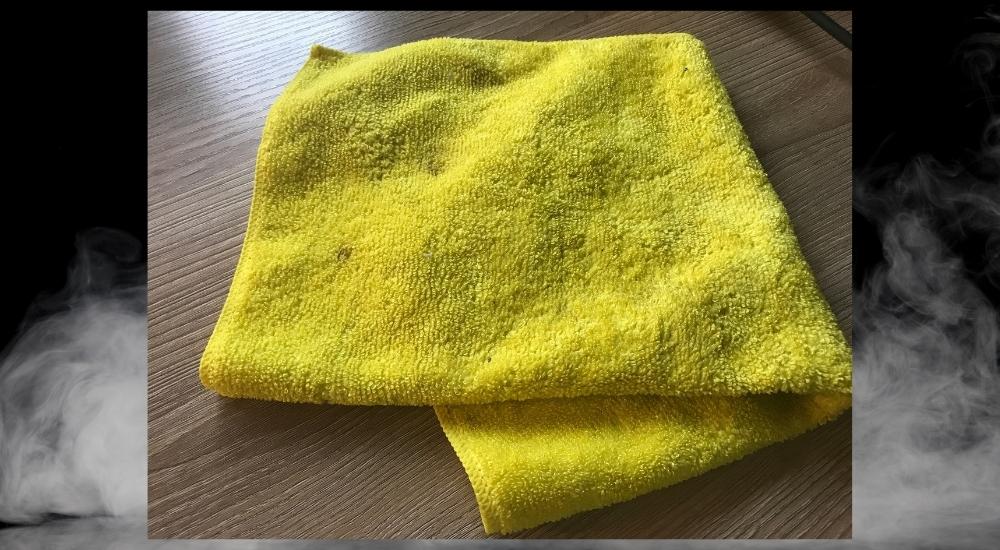
One preventative measure for extending the shelf-life of your strings is to wipe them off with a microfibre cloth after playing the guitar, preferably, a lint-free cloth. You can wipe down your strings with a cloth to make sure they’re always relatively moisture and oil-free.
My first guitar teacher told me about this method, and I stuck with it for a long time, however, there will come a time when the strings rust and collect debris regardless of how much you clean them.
It will happen no matter what. This is a good way to get a few more weeks out of your strings, as is washing your hands.
2) Wash Your Hands Before Playing Guitar
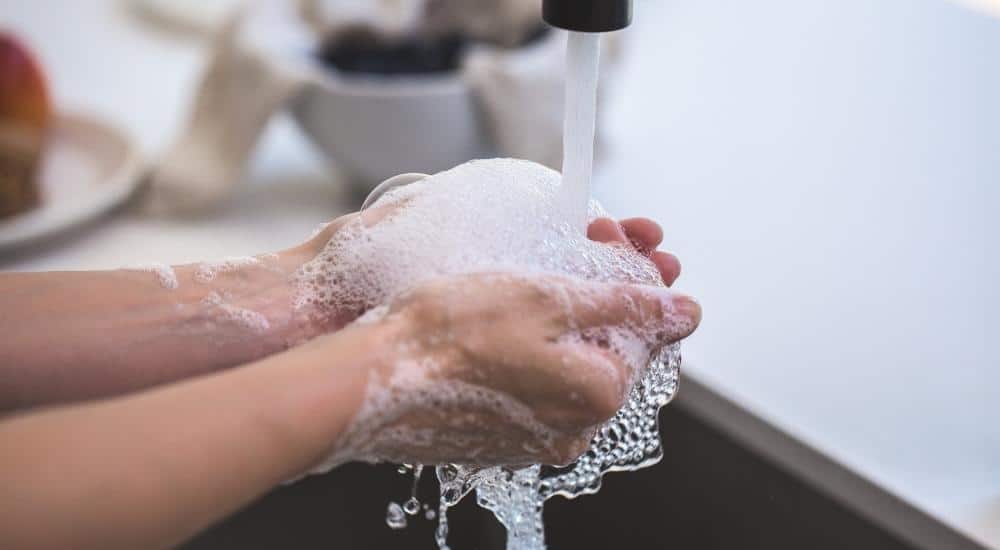
Washing your hands before you play is a great way to ensure the quality of your guitar strings. If you’re anything like me, however, you rarely do this, because it’s best to just pick up your guitar and start playing whenever the mood strikes.
Additionally, if you’re a travelling musician, a tip like this is just unrealistic because there is so much else going on.
Regardless, your hands contain moisture and skin oils that facilitate the oxidation process of metals, as well as the growth of gunk, so if you can just take the time to wash your hands with soap before you play, you can make a big difference.
Furthermore, your skin has oils in it which include other minerals, like salt, sugar, and other liquids, and all of these liquids perpetuate or help the process of gunk formation.
If you’re wiping your guitar strings off and washing your hands, the next thing you can do is buy Elixir strings.
3) Purchase Anti-Rust Strings Like Elixirs
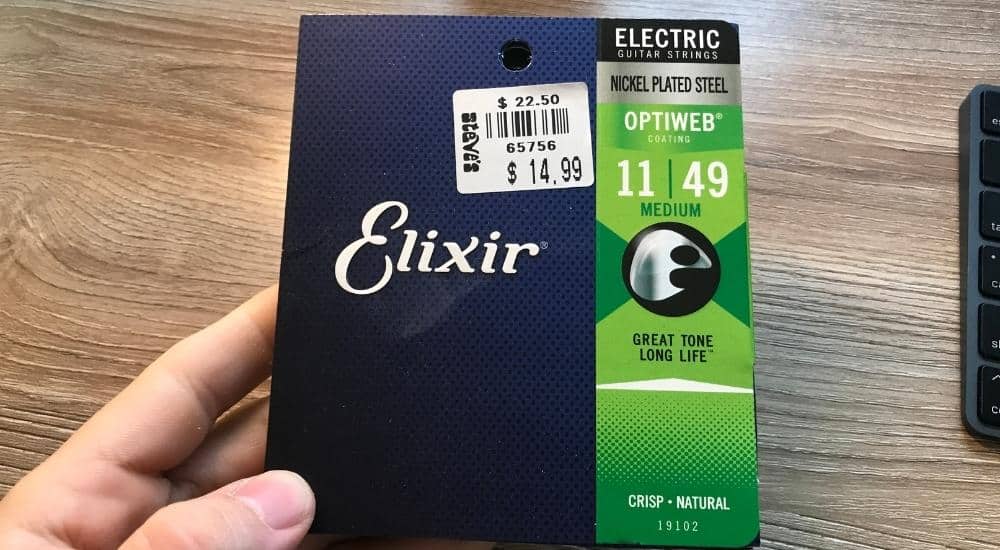
Back in the day, I always used to purchase Elixir strings, which come with a chemical compound that thwarts the development of rust and tarnish. They’re known for creating long-lasting strings, however, it’s up to you if you want to use a product with additional chemicals.
Other brands use a chromium coating, which also does a lot for thwarting degradation. Elixir strings tend to be a bit more expensive than your average pair of Ernie Ball strings, but I find they typically last a much longer amount of time, in fact, I did an experiment where I came to that exact conclusion.
I like to think of it as laying down the cash for purchasing a nice new jacket. If you buy the cheapest jacket or pair of jeans, you can expect they won’t last an entire year, more like 6-8 months. However, if you drop $500 on a nice leather jacket, you’ll probably have that item for decades.
You generally get what you pay for. I’ll be honest though, these days I’ve just been buying Ernie Balls because I need practice setting up my instrument so I put new strings on the instrument about every month or so. This is also much better for recording as well.
4) Humidity Control
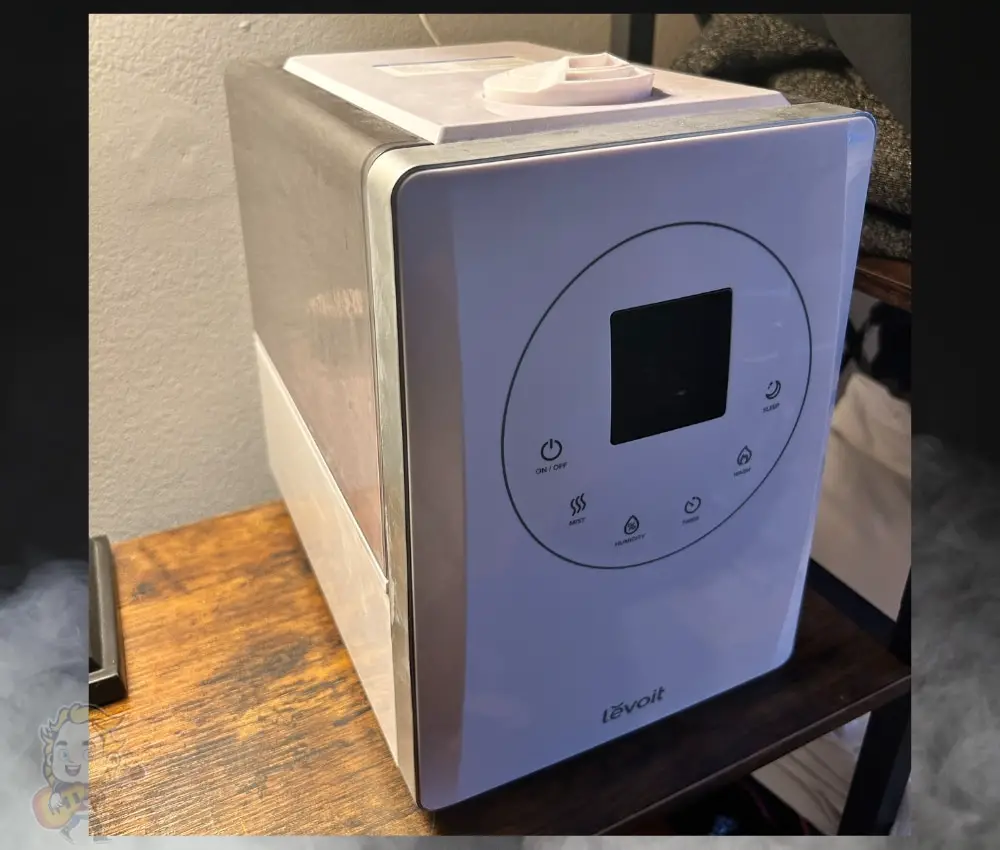
If you’re really serious about slowing the tarnishing process, you can purchase a humidifier for your home to make your living space the perfect humidity for not only keeping your guitar strings fresh but also for comfort.
Essentially, what a humidifier does is that it maintains the humidity levels in your living space.
Thanks to the market economy, there are a number of types out there as well, including humidifiers that regulate the humidity of your instrument specifically, they’re also called soundhole humidifiers. There are products that are meant just for your place as well.
The best type of humidifier, however, is the guitar case humidifier, which has within it a control for maintaining the optimal levels.
These are a lot more expensive but they’re amazing. Guitar players who travel a lot would definitely be big fans of these, and without a doubt, these are the options of choice for world-class musicians.
With that said, you’ll have to maintain the humidifier with water every three or four days, but it’s not that big of a deal.
The best humidifiers, especially the more modern ones, come with a hygrometer that actually measures the perfect level of humidity, that way you can adjust the level of moisture.
In case you didn’t know, humidity is just a way of measuring the amount of moisture in the air, and the higher the humidity, the more moisture there is in the air.
A consequence of this is that more humidity facilitates rust/tarnish forming on your guitar strings, and not only your guitar strings but other metal things in your room (how to recycle old strings in my guide).
If you don’t have a humidifier, and you’re serious about keeping your gear fresh, I recommend getting one. As I just mentioned, these are great for not only your strings, for comfort, keeping many of your electronics safe, and even your skin’s health.
During those winter months, it helps to have one of these for a number of reasons.
![Hygrometer - Can Guitar Strings Rust or Do They Tarnish [ANSWERED]](https://travelingguitarist.com/wp-content/uploads/2021/11/Hygrometer-Can-Guitar-Strings-Rust-or-Do-They-Tarnish-ANSWERED.jpg)
According to Guitar Fella, the perfect range for humidity in your house/apartment is between 40% and 60%.
This range discourages the growth of microorganisms, but it isn’t dry enough to damage your instrument due to low moisture. In other words, if your room is too dry, it can actually cause wood to crack.
5) Clean Your Entire Guitar After Every String Change
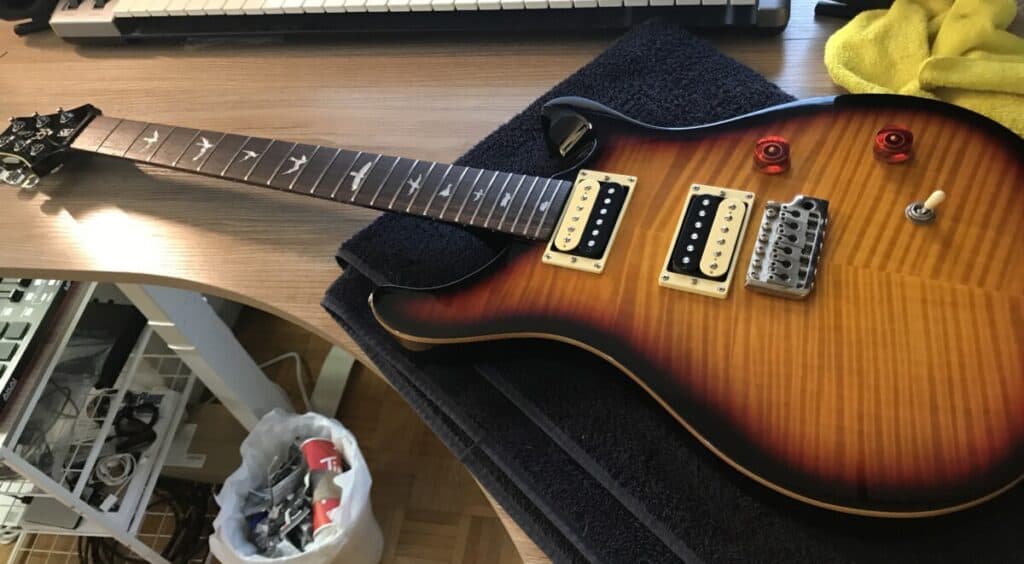
If we’re being completely honest here, cleaning your entire guitar after every string change is only tangentially related, but I thought it was worth throwing in there. There’s something about cleaning your entire guitar after every string change that just makes the instrument feel new and fresh again.
I usually use a bottle of Gibson guitar cleaner, and I wipe the entire thing down with a microfibre cloth.
A good place to clean is the fretboard, including the frets themselves. A lot of grime, dust, and oils tend to accumulate on the fretboard, so grab your guitar cleaner and cloth and rub off all of that guck on the guitar.
It will look a lot better and possibly even feel a lot better. Some people even use very fine steel wool to wipe off their frets as well, however, I usually don’t do this, because I’m worried about jeopardizing the frets.
6) Use String Conditioners or String Cleaners
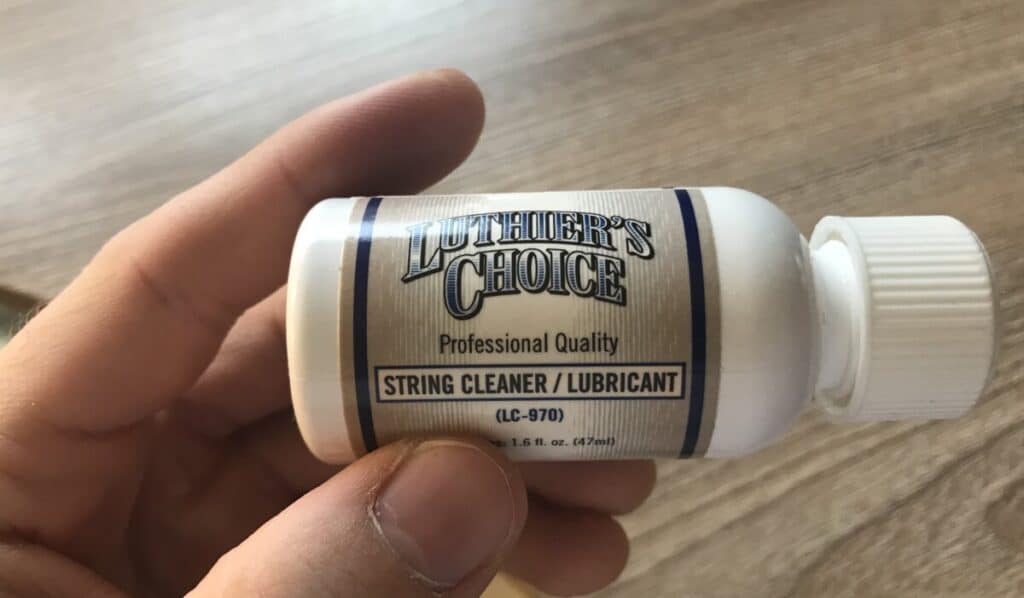
I included this on the list although I’m not sure how I feel about this kind of product. String cleaners and conditioners state that you can preserve the life of the string with their product but I’m not so sure about it although I used to think it was great (I’m pretty sure that’s what I even said in the video below).
I’ve used it before and it does help remove the gunk, however, I’d rather just get a new pair of strings. I’m not interested in buying yet more cleaners because I already have enough.
That said, if you’re interested in giving it a shot, you can pick up a bottle of string conditioner from Amazon for a solid price, depending on the brand.
String conditioners aren’t a fix-all solution. it’s more of something that you do every once in a while just to freshen up the strings.
String conditioners are controversial, with many users saying they’re simply a money grab and they don’t actually work, while others swear by them.
It’s up to you to decide but I say you should just pass on it. Regardless, a bottle of string conditioner is rarely over $10, so it’s worth trying if you’ve never done so before.
Other Articles You May Be Interested In
- Can Guitar Strings Cut Your Fingers?
- Does Boiling Guitar Strings Really Work? [Full Guide]
- Are Guitar Strings Conductive?
- Why Do Guitar Strings Go Out Of Tune? (The REAL Reason)
- How Do I Know What Gauge My Guitar Strings Are?
YouTube Video Tutorial
Conclusion
If we’re going to be completely honest about all of this, however, there’s nothing you can really do to thwart the eventual decaying of your guitar strings. They will decline eventually, and there’s nothing you can do about it.
You can only slow the process by using things like string conditioners, and humidifiers; cleaning your strings daily; washing your hands on a regular basis, and buying the best guitar strings available, including Elixir strings among other brands that use the anti-tarnish chemical on them.
By the way, while they do wear out, you don’t have to worry about them being dangerous as I’ve explained elsewhere on the site.
Important Things to Mention About Rusting Guitar Strings
1) The Best Thing To Do Is Just Buy New Strings
In my opinion, guitar strings are super cheap and they’re worth the $10 a month, so I just buy a new pair whenever the guitar needs it. But I get it, not everyone prioritizes the same thing. I would rather spend $10 on strings once per month than eat out for lunch.

 Written By :
Written By :![Soundhole Humidifier - Can Guitar Strings Rust or Do They Tarnish [ANSWERED].jpg](https://travelingguitarist.com/wp-content/uploads/2021/11/Soundhole-Humidifier-Can-Guitar-Strings-Rust-or-Do-They-Tarnish-ANSWERED.jpg)
